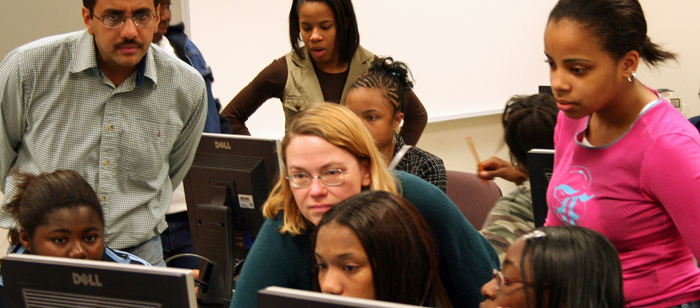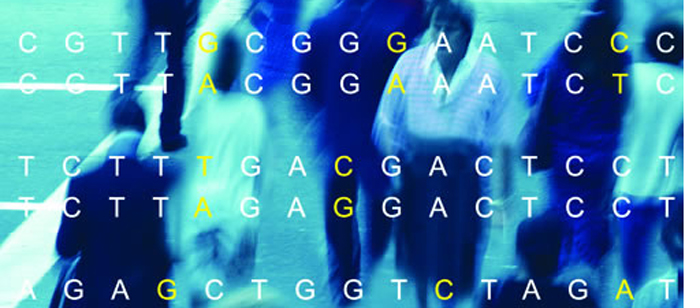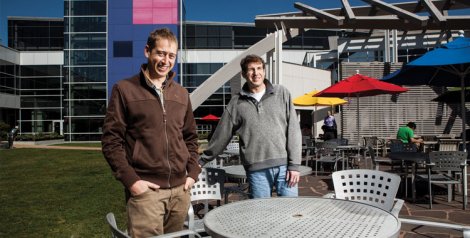Please visit the CSEE Required Technology page for more information.
Picking your PC: Computer Recommendations for Incoming Freshman
TechCouncil of Maryland reveals new career resource, CORE
 Photo courtesy www.techcouncilmd.com
Photo courtesy www.techcouncilmd.com
If you're tired of sifting through sketchy jobs on Craigslist, why not try the TechCounil of Maryland (TCM)'s new job resource CORE (Career Opportunities REsources).
CORE's database is full of jobs in the areas of biotechnology, information technology, and business. "CORE will help our region's companies attract and match talented individuals, students, recent graduates and professionals in search of their next challenge," says the website.
Based in Rockville, TCM is the areas largest technology trade association in Maryland. With over 500 members, TCM's mission is to promote the area's technology industry.
UMBC receives NSF award to develop new freshman seminar for computing majors

UMBC CSEE Professor Penny Rheingans received an NSF research award, Transforming the Freshman Experience of Computing Majors, to develop and evaluate an innovative first-year seminar for computing majors aimed at increasing retention, completion, and success among students, especially women and those from underrepresented groups. Dr. Rheingans will serve as the principal investigator for the three year, project that will also include Drs. Marie desJardins (CSEE), Carolyn Seaman (IS) and Susan Martin (CWIT).
The seminar will combine elements from successful first-year engineering courses, introductory computing courses, general first-year seminars and the new AP CS Principles course to give new computing majors an overview of the discipline, foundational technical skills, a group design experience and relevant professional development. The highly interactive and learner-centered course will be delivered by a team of computing professors, staff with student affairs experience, and undergraduate peer mentors and teachers. The project will also include regional workshops to share course materials and insights with computing faculty from local two and four-year institutions.
UMBC students show-off original video games at Gamescape 2012
Tired of playing Diablo III?
If you head to Gamescape next weekend, you'll have a chance to try your hand at over a dozen original video games dreamed up by local students and indie game developers. As part of Artscape–the country's largest free arts festival–the annual three-day video game celebration will take place in MICA's Bunting Center from July 20-22.
Among developers like Pure Bang Games (makers of Zombie Chess) and Crankshaft Games (Eternal Silence), representatives from UMBC's own Game Developers Club will be in attendance with three games of their own. The game concepts, explains club president Alex Grube (CS '13), were conceived during a 48-hour game jam last September, and the group has been hard at work developing the games since the beginning of the 2011-2012 school year. They are:
Black Fowl is a 3D hack and slash third person role playing adventure game. You play Max, a young orphan on a quest to discover his roots. Set in the Middle Ages, highlights of the game include the ability to use magical powers (like flying), and to engage in combat while riding a bull.
Cosmoknights is a 2D multiplayer that follows a capture-the-flag concept. Two combating astronauts are stranded in an asteroid field. Your mission is to collect spare parts for your out-of-commission spaceship and get home first. Oh, and try not to get hit by an asteroid.
X-Zip-It! boasts the tagline: "It's Skyrim with zippers, but without the Skyrim." In this 2D mobile phone game, you must unzip the zipper while avoiding obstacles like buttons, Velcro, buckles, and necklaces.
UMBC's Game Development Club will discuss Black Fowl, Cosmoknights, and X-Zip-It on Sunday, July 22nd from 12 p.m. to 1 p.m. To learn more about the event, check out the website.
CSEE faculty receive NSF grant to study computing education in Maryland high schools

Professor Marie desJardins (PI) along with co-principal investigators Professor Penny Rheingans and Dr. Susan Martin received a research award worth $200,000 from the National Science Foundation's program on Computing Education for 21st Century. Their 18 month research project, Building Community and Knowledge to Increase Statewide Support for Computing Education, will gather data about the status of Computer Science education in Maryland high schools and build relationships among high school teachers, community college and university faculty, and state education administrators to facilitate and increase state-level support for lasting improvements to computing education.
Despite the overall success of the K-12 education system in Maryland, opportunities to study computer science vary tremendously among the 24 school systems and approximately 200 high schools in the state. This disparity can be attributed to several factors, including the lack of a state-mandated computer science high school graduation requirement, the fact that there is no state-required teacher certification in the discipline, the absence of a standardized computer science curriculum, and barriers to entry for girls and underrepresented minorities.
The effort has two immediate objectives: (1) performing an assessment of the current state of high school computer science in each of the 24 Maryland school systems and (2) increasing knowledge about national issues associated with computer science education among high school and state administrators in Maryland through state-wide summit meetings for teachers, administrators, and higher education faculty. The long term goal is to develop curriculum and teacher development programs that will improve the quality, breadth, and student diversity of computer science education in Maryland.
Kugaonkar MS defense: Finding Associations among SNPs for Prostate Cancer

MS Thesis Defense
Finding associations among SNPs for
prostate cancer using collaborative filtering
Rohit Kugaonkar
9:00am Wed. 18 July 2012, Room ITE 325b
Prostate cancer is the second leading cause of cancer related deaths among men. Because of the slow growing nature of prostate cancer, sometimes surgical treatment is not required for less aggressive cancers. Recent debates over prostate-specific antigen (PSA) screening have drawn new attention to prostate cancer. Due to the complicated nature of prostate cancer, studying the entire genome is essential to find genomic traits. Due to the high cost of studying all Single Nucleotide Polymorphisms (SNPs), it is essential to find tag SNPs which can represent other SNPs. Earlier methods to find tag SNPs using associations between SNPs either use SNP's location information or are based on data of very few SNP markers in each sample. Our study is based on 2300 samples with 550,000 SNPs each. We have not used SNP location information or any predefined standard cut-offs to find tag SNPs. Our approach is based on using collaborative filtering methods to find pair wise associations among SNPs and thus list top-N tag SNPs. We have found 25 tag SNPs which have highest similarities to other SNPs. In addition we found 16 more SNPs which have high correlation with the known high risk SNPs that are associated with prostate cancer. We used some of these newly found SNPs with 5 different classification algorithms and observed some improvement in prediction accuracy over using the original known high risk SNPs. The classifier can be used in a decision to perform further testing in case of a "yes" answer by the classifier.
Committee: Drs. Yelena Yesha (chair), Anupam Joshi, Aryya Gangopadhyay and Micheal Grasso.
UMBC Performing Arts and Humanities Building unfenced

This week the fencing around UMBC’s new Performing Arts and Humanities Building came down, making the area behind the ITE and ECS buldings more attractive and access to parking more convenient. The PAHB building has been turned over to UMBC and furniture will be delivered next week. It will be open later this summer in time for the Fall 2012 semester. Construction continues on the second phase of the building.
The PAHB will be home to the Department of Ancient Studies, the Department of Dance, the Department of English, the Department of Music, the Department of Philosophy, the Department of Theatre, the James T. and Virginia M. Dresher Center for the Humanities, the Humanities Scholars Program, and the Linehan Artist Scholars Program.
Ph.D. defense: Fatih Senel on Relay Node Placement for Federating Segmented Wireless Sensor Networks

Ph.D. Dissertation Defense
Relay Node Placement for
Federating Segmented Wireless Sensor Networks
Fatih Senel
2:00pm Tuesday, 10 July 2012, ITE 325b
Recent years have witnessed a growing interest in the applications of Wireless Sensor Networks (WSNs). Most notable among these applications are those operating in hostile environments space exploration, border protection, combat field reconnaissance, and search and rescue. Due to the harsh surroundings, WSNs may suffer from a large scale damage that causes many nodes to fail simultaneously and the network to get partitioned into multiple disjoint segments and its services become very limited. In such a case, restoring the network connectivity is very important in order to avoid negative effects on the applications. Linking disjoint segments may not be feasible through coordinated repositioning of some set of nodes as the scope of the damage is so wide that cannot be determined. One of the viable solutions for federating damaged WSNs is to deploy additional resources, i.e. relay nodes, to form inter-segment multi-hop paths.
In this dissertation, we tackle technical challenges related to the federation of segmented WSNs. We present a set of effective techniques that for repairing the damaged WSN using the least number of relay nodes (RNs) as well as maintaining some desirable topology features such as robustness against failures, network coverage and balanced traffic load. The correctness and time-complexity of all proposed approaches are analyzed and their performance is validated through extensive simulation experiments.
Committee: Drs. Mohamed Younis (Chair), Charles Nicholas, Samuel Lomonaco, Tim Oates, Kemal Akkaya and Waleed Youssef
MS defense: Integrating Domain Knowledge in Supervised Machine Learning to Assess the Risk of Breast Cancer Using Genomic Data

MS Thesis Defense
Integrating Domain Knowledge in Supervised Machine Learning
to Assess the Risk of Breast Cancer Using Genomic Data
Aniket Bochare
9:00am Friday 29 June 2012, ITE 325b
Breast cancer is the most common form of cancer in women. Breast cancer comprises 22.9% of the invasive cancers in women and 16% of all the female cancers. Currently, treatment decisions are based primarily on clinical parameters, with little use of genomic data. Our study takes into consideration the data of postmenopausal women of European descent and their single nucleotide polymorphism (SNP) information to assess the risk of developing breast cancer. We used various supervised machine learning and data mining techniques to generate a model for predicting risk of breast cancer using only genomic data.
In this research we propose an approach to select the nine best SNPs using various feature selection algorithms to improve binary classification accuracy and validate our results with the existing literature. The machine learning model generated without the domain knowledge yields poor prediction results. After the addition of the domain knowledge of the 11 SNPs into the original training set we performed classification using the best features obtained by feature selection techniques. The machine learning model generated using both the domain knowledge and the feature selection techniques performed much better compared to the naive approach of classification.
Committee: Drs. Yelena Yesha (chair), Anupam Joshi, Aryya Gangopadhyay and Micheal Grasso
Computer Science Alumni on working at Google
 It's got a bowling alley, a piano in the lobby, a T-Rex skeleton, and eighteen cafeterias. It might sound like a theme-park, but it's the Googleplex, a.k.a. Google headquarters, located in Mountain View, California.
It's got a bowling alley, a piano in the lobby, a T-Rex skeleton, and eighteen cafeterias. It might sound like a theme-park, but it's the Googleplex, a.k.a. Google headquarters, located in Mountain View, California.
This extremely enlightened workplace, which features a slew of employee benefits like a free shuttle to work, laundry services, and even haircuts, might sound like an un-productive paradise, but the benefits are actually put in place to offset all the hard work and dedication of the employees.
So says an article in the Summer issue of UMBC Magazine, where Computer Science alumni Jeffrey Burgan '83 (pictured), Sandor Dornbush '06 (pictured), Jeetendra M. Soneja '04, and Robert Banz '95 talk about what it's like to work for Google.
Check out the article here.
Photo Courtesy Gabriela Hasbun



